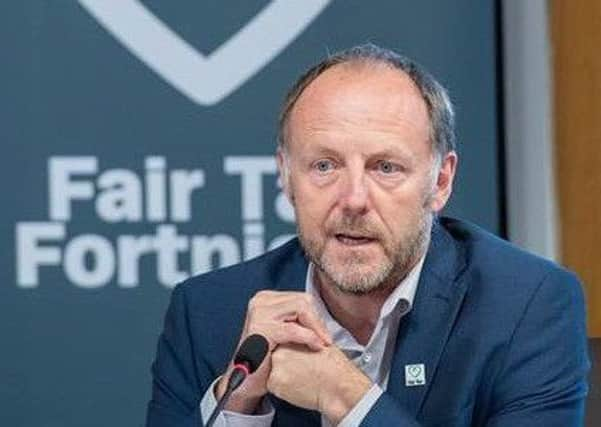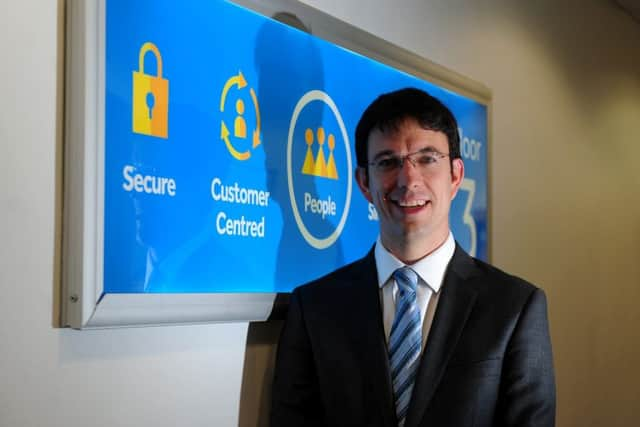Meet the Yorkshire businesses that believe in paying their fair share in tax


There seems to be “something in the water” in West Yorkshire when it comes to a commitment from businesses towards paying fair tax.
The likes of FTSE-listed paving specialist Marshalls, Leeds Building Society and vegetarian foods and natural products wholesaler Suma Wholefoods have all dedicated themselves to not only conforming to the letter of the law but also to its spirit.
Advertisement
Hide AdAdvertisement
Hide AdSeveral businesses such as these three are accredited by the Fair Tax Mark certification scheme, which was launched in 2014 and recognises businesses for good tax practices.


Paul Monaghan, chief executive of the Fair Tax Mark, says: “It’s fair to say it feels like there is something in the water in West Yorkshire.
“We have got a definite concentration of businesses there. We’re assessing other businesses from West Yorkshire right now, who we will likely announce soon.”
However, Mr Monaghan has been unable, so far, to put his finger on just why such a cluster of Fair Tax-accredited businesses has formed in this part of the country.
Advertisement
Hide AdAdvertisement
Hide Ad“I’m not quite sure what it is,” he says. “Maybe it just goes back to that industrial heritage in that part of the world, which was linked to social plans. West Yorkshire is right up there for us in terms of a concentration in businesses.”


Several businesses that have been accredited were already adhering to what the accreditation scheme classes as fair tax practices and they only needed to make minor changes to gain the mark.
Marshalls came across the Fair Tax Mark purely by chance. The Elland-based firm’s board asked for a study to be carried out on exactly how much tax the company was paying.
Martyn Coffey, CEO of Marshalls, says: “We didn’t have to change dramatically from what we were doing. This is the way that we do business, so why not get accredited?”
Advertisement
Hide AdAdvertisement
Hide AdFor Leeds Building Society it was slightly different. As a member-led organisation, it polled its members on what is important to them and 96 per cent said that paying fair tax was key.


Richard Fearon, CEO of Leeds Building Society, says paying fair tax is also a vital part of the firm’s ethos.
He adds: “Some people see tax as a burden. We wouldn’t see it that way. We think it’s about how can businesses contribute to society. I would say paying our tax fairly is part of our DNA.
“Building societies are all about people helping people. Our members see it as important. I hope that by doing this we will encourage other businesses to play their part too.”
Advertisement
Hide AdAdvertisement
Hide AdThe only change Leeds Building Society had to make to get the accreditation was publishing its tax policy on the firm’s website.
Mr Fearon says he is delighted Yorkshire is leading the way on the Fair Tax Mark and hopes businesses that have signed up for the scheme may have had a role to play in encouraging others to also sign up.
He adds: “I’m on the Business in the Community Yorkshire and Humber advisory board. There are a number of businesses on there and when we get together and talk, this is one of the things I’ve spoken about. I hope that’s perhaps encouraged others to get on board.”
Paying fairer tax is “definitely much higher up the agenda” for businesses, according to Mr Monaghan.
Advertisement
Hide AdAdvertisement
Hide Ad“We go back 10 years. Tax avoidance wasn’t even on the radar for the public,” Mr Monaghan says. “In recent years, it’s become the number one issue when it comes to corporate concern.”
He adds: “I don’t think it’s possible yet to say that there are enormous boycotts going on and transfer of customers to good tax-payers.
“That’s one of the reasons we set up, which is that consumers were saying we know who the bad guys are but we don’t know who the good guys are.”
Recent governments have looked to tighten up regulations when it comes to tax avoidance, the Fair Tax Mark says, in response to public pressure.
Advertisement
Hide AdAdvertisement
Hide AdHowever, Mr Monaghan says there is still much more to do. The Fair Tax Mark would like HMRC to be better resourced when it comes to pursuing businesses not paying their fair share.
Mr Coffey believes the Government should take tax payment into consideration when it puts projects out to tender.
“If one company pays taxes on profits and the other one doesn’t, then that should be a factor that is considered,” he says.
The major issue for Mr Monaghan is having a level playing field for businesses, citing the likes of Amazon and Google who have come under fire for their tax practices.
Advertisement
Hide AdAdvertisement
Hide AdHe said: “A business can’t adequately compete if other companies, because of the way they’re structured, enjoy tax reliefs. It gives them the ability to come in at a much lower margin and drive other businesses out of the market place.”
There’s a philosophical argument for paying the right amount in taxes for Leeds Building Society and that is that it’s one of the key ways in which the business contributes to society.
“We’re a successful and profitable business so it’s really important we pay our fair share,” Mr Fearon says.
“Our members think that too. Fundamentally, you’ve got tax-paying for public services, helping communities thrive and ultimately it helps us.”
Advertisement
Hide AdAdvertisement
Hide AdFor Marshalls, having a fair tax policy in place makes the company more attractive to shareholders.
“We’re a PLC, so that means we’re looking to attract shareholder interest and I think people are becoming more discerning with companies they’d like to invest in,” Mr Coffey says.
While these businesses gain recognition with the Fair Tax Mark, the main underlying motivation for paying their fair share of tax is it’s the right thing to do for the good of society.
If the Fair Tax Mark can stumble across more clusters of businesses willing to do the right thing, like the one in West Yorkshire, then society is only likely to benefit.
ARE THEY BEING OPEN WITH THE PUBLIC?
Advertisement
Hide AdAdvertisement
Hide AdThe Fair Tax Mark isn’t necessarily about encouraging businesses to pay a large amount of tax.
The scheme breaks its standards down into three areas. One is policy, which has to be in the public domain and sets out the firm’s approach to matters such as tax avoidance and tax havens.
Paul Monaghan, chief executive of the Fair Tax Mark, says: “Secondly, it’s transparency. Is enough information in the public domain in terms of income, profit and tax that’s paid that a layperson could form a view as to whether a fair amount of tax is being paid?
“If you’re a multinational, we require that information is on a country-by-country basis.
Advertisement
Hide AdAdvertisement
Hide Ad“That’s where you would be able to spot whether profit-shifting has been taking place and money being moved to low-tax jurisdictions.
“Thirdly, we look at the actual amount of tax paid over the preceding four years.
“We design the standards so it is possible to pay low rates of corporation tax and still get the Fair Tax Mark if your policy and reporting is exemplary.”
It all comes down to a business operating to the letter and spirit of the law. For example, a firm claiming R&D tax relief in the UK would be fine with the Fair Tax Mark as long as it was being used for research and development here.
However, it would deem it against the spirit of the law if a firm claimed tax relief in another more favourable country when the business is based here.